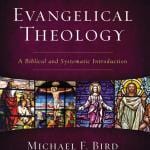Jeffrey Munroe
Reading Buechner: Exploring the Work of a Master Memoirist, Novelist, Theologian, and Preacher
Downers Grove, IL: InterVasity Press, 2019.
Available at IVP and Koorong
By Laura Thierry
Some memoirists are also novelists. Some novelists are also theologians. Some theologians are also preachers. But it is exceedingly rare for a person to be all of these things at once. Unless, of course, they are Frederick Buechner (pronounced Beek-ner). Few Christians of the last century have covered so many genres. And, given the enigmatic breadth of Buechner’s career, it is unsurprising that he, in the full context of his diverse writing, is less than well-known. Moreover, while his work has significantly influenced a generation of Christian spiritual writers and artists, there has been little available to introduce his work to a new generation. Such a void makes Jeffrey Munroe’s Reading Buechner a particually welcome offering. Munroe provides a first-rate introduction to this brilliant and multifaceted, if at times puzzling, figure by walking his readers through Buechner’s essential corpus—genre by genre, work by work.
Munroe, in rather Buechnerian fashion, begins by telling the story of his own encounter with his subject’s writings. In doing so he reveals two key characteristics of this book. Firstly, Munroe writes Buechner’s story, not through the lens of first-hand knowledge of Buechner as a person, but rather through the eye of Buechner’s books. Secondly, he writes, not as an impassive critic, but with the warmth of one who bears a deep love for the subject matter at hand. In doing so, Monroe extends “an invitation in a spirit of love and admiration” to consider one whom he believes to be “the greatest spiritual writer of our times.” (6).
The book is divided into four sections. Part one, “Fredrick Buechner as Memoirist”, opens up the narrative of Buechner’s life through an explanation of the genre that he himself largely pioneered: modern spiritual memoir. Buechner wrote, not one, but seven of these works. Here Munroe explores the four “essential” memoirs, exploring Buechner’s biography through these successive and maturing sojourns of the latter’s spiritual life.
In part two, “Fredrick Buechner as Novelist”, Munroe examines the more obscure world of Buechner’s fiction. While these novels are certainly less well known amongst Buechner’s Christian audience, Munroe explores them with a sympathetic eye to the audience Buechner intended them for—those outside of the church—providing a helpful analysis of how they do indeed fit within his overall authorial mission.
Part three, “Frederick Buechner as Popular Theologian”, unpacks the writer’s deep desire to clothe the Christian faith in fresh and clean language, while noting the disquieting effect that that at times had on those belonging to the church.
And finally, part four, “Frederick Buechner as Preacher” explores the ultimate genre of this incredibly adaptable man: engagingly communicating the Christian faith through preaching. This section is of particular benefit for any considering the role of language and words in our ability to rightly convey the glorious message of the gospel.
In sum, this work provides a timely and sympathetic introduction to the writings of Fredrich Buechner in a manner that, not only captures the facts of Buechner’s life, but also reveals the tone of Buechner’s corpus. It would make for enjoyable Sunday afternoon or bedtime reading, especially for those involved in writing or preaching, but ultimately for any who long to explore through one life narrative “the subterranean works of grace,” hidden in treasure of darkness.
Laura Thierry a PhD candidate at Ridley College, researching medieval hagiography, Christology, and theology of the body.












